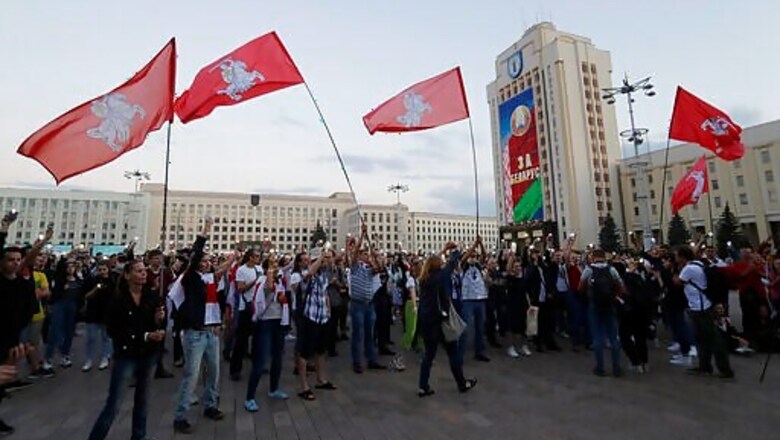
views
MINSK, Belarus: Authorities in Belarus on Tuesday steadily cranked up the pressure on protesters pushing for the resignation of the country’s authoritarian leader, jailing several opposition activists, summoning others for questioning and selectively ordering demonstrators to appear in court.
Courts in Minsk were considering charges against two members of a council that opposition activists established last week to negotiate a transition of power following President Alexander Lukashenko’s winning a sixth term in an election that critics contend was rigged.
Lukashenko has firmly rebuffed offers of dialogue from the Coordination Council, which rejects the official results of the Aug. 9 vote that extended his 26-year rule.
While courts considered charges against two council members detained Monday, Sergei Dylevsky and Olga Kovalkova, another member, former Belarusian culture minister and diplomat Pavel Latushko, was summoned for questioning over his role in the opposition body.
They are trying to push me out of the country, Latushko told reporters. I have been threatened with arrest and prison violence, but I’m not planning to leave Belarus.
Belarus most famous writer, Svetlana Alexievich, who won the 2015 Nobel Prize in literature, also received a summons after joining the council.
Lukashenko has dismissed the thousands of protesters who have been demonstrating for over two weeks as as Western puppets and threatened the council members with criminal charges for attempting to create what he described as a parallel government. Prosecutors opened a criminal inquiry on charges of undermining national security, an allegation rejected by the council.
The Coordination Council isn’t attempting to take power, Latushko told reporters after being questioned. All we want is to try to find a solution for the political crisis.
The protests in Belarus erupted after official results handed Lukashenko a sixth term with 80% of the vote. They were galvanized by a brutal crackdown in the initial days after the election, when police detained nearly 7,000 people. Hundreds were injured when officers fiercely dispersed peaceful protesters with rubber bullets, stun grenades and clubs. At least three people died.
The bodies of two opposition supporters also were found hanged in forests. Police declared that the deaths were suicides, but the opposition has contested the claim.
The police crackdown fueled public anger, helping swell the number of protesters that reached an unprecedented peak of about 200,000 for two consecutive Sundays. The huge crowds forced the government to back off and allow the demonstrations to go largely unhindered for the past two weeks.
In another challenge to Lukashenko, thousands of workers at major industrial plants across Belarus have gone on strike to demand his resignation.
In a show of defiance, the 65-year-old president toted an assault rifle as he arrived at his residence by helicopter on Sunday while protesters rallied nearby.
Following Lukashenko’s directives last week to get tougher on protesters, police started beefing up their presence on the streets and cordoning off some areas in the Belarusian capital. They detained at least five protesters in Minsk and another five elsewhere in the country on Monday after days of inaction, a signal that the authorities might resort to force again to end the protests.
The Interior Ministry said Tuesday that it issued 39 court summons to protesters the previous day.
As the authorities toughened their stance, Sviatlana Tsikhanouskaya, the main opposition challenger in the Aug. 9 vote, reaffirmed her push for a new presidential election in a speech to European Union delivered via video-link from Vilnius, the capital of Lithuania.
Tsikhanouskaya, a 37-year-old former English teacher who moved to Lithuania a day after the vote under official pressure, said she was ready for dialogue with Lukashenko’s government.
The intimidation will not work,” she said. We will not relent. We demand to respect our basic rights. We demand all political prisoners freed. We demand to stop violence and intimidation by the authorities.
___
Associated Press writers Vladimir Isachenkov in Moscow and Lorne Cook in Brussels contributed.
Follow APs coverage of Belarus at https://www.apnews.com/Belarus
Disclaimer: This post has been auto-published from an agency feed without any modifications to the text and has not been reviewed by an editor




















Comments
0 comment